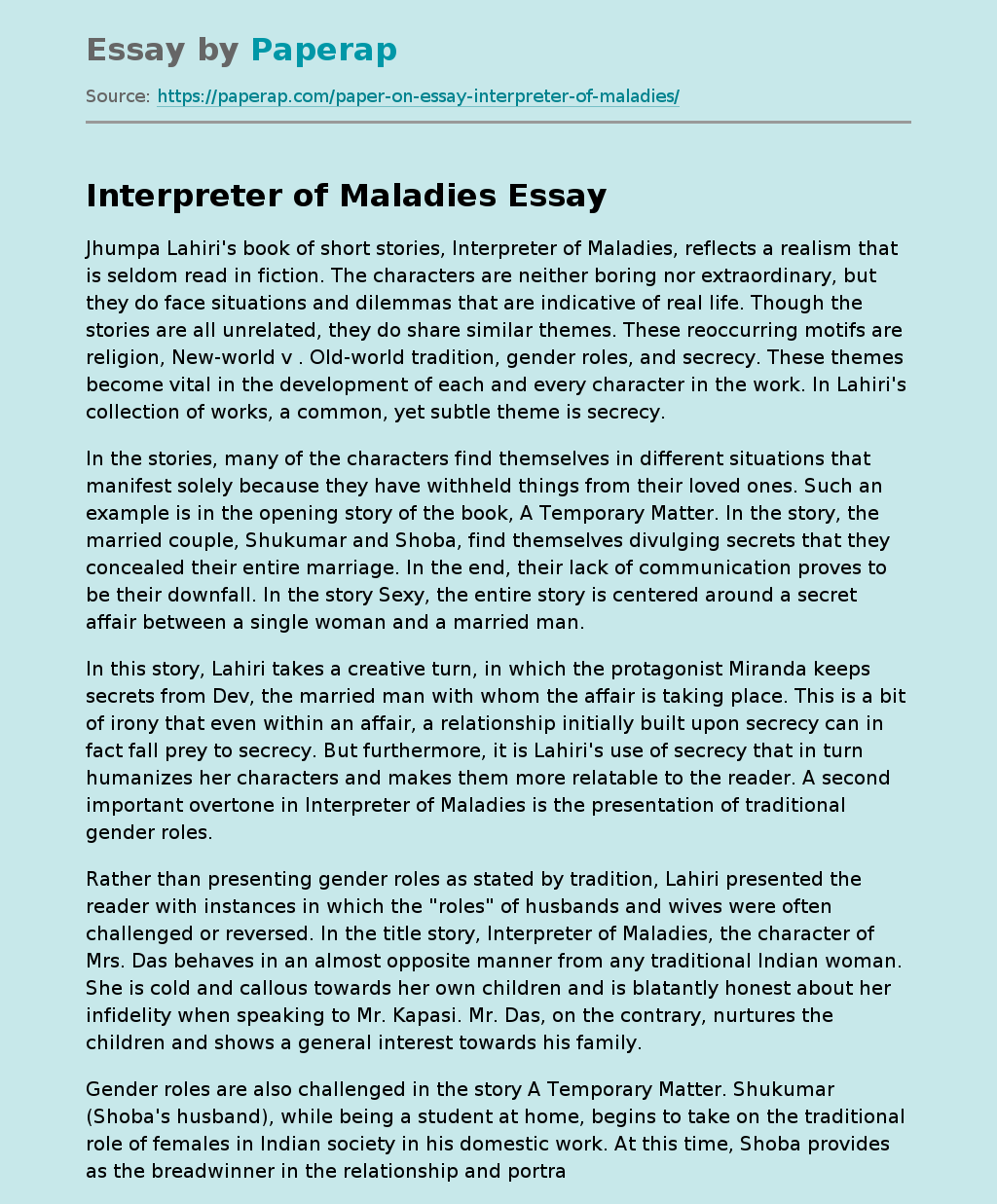Jhumpa Lahiri's by Interpreter of Maladies
Jhumpa Lahiri’s book of short stories, Interpreter of Maladies, reflects a realism that is seldom read in fiction. The characters are neither boring nor extraordinary, but they do face situations and dilemmas that are indicative of real life. Though the stories are all unrelated, they do share similar themes. These reoccurring motifs are religion, New-world v . Old-world tradition, gender roles, and secrecy. These themes become vital in the development of each and every character in the work. In Lahiri’s collection of works, a common, yet subtle theme is secrecy.
In the stories, many of the characters find themselves in different situations that manifest solely because they have withheld things from their loved ones. Such an example is in the opening story of the book, A Temporary Matter. In the story, the married couple, Shukumar and Shoba, find themselves divulging secrets that they concealed their entire marriage. In the end, their lack of communication proves to be their downfall. In the story Sexy, the entire story is centered around a secret affair between a single woman and a married man.
In this story, Lahiri takes a creative turn, in which the protagonist Miranda keeps secrets from Dev, the married man with whom the affair is taking place. This is a bit of irony that even within an affair, a relationship initially built upon secrecy can in fact fall prey to secrecy. But furthermore, it is Lahiri’s use of secrecy that in turn humanizes her characters and makes them more relatable to the reader.
A second important overtone in Interpreter of Maladies is the presentation of traditional gender roles.
Rather than presenting gender roles as stated by tradition, Lahiri presented the reader with instances in which the “roles” of husbands and wives were often challenged or reversed. In the title story, Interpreter of Maladies, the character of Mrs. Das behaves in an almost opposite manner from any traditional Indian woman. She is cold and callous towards her own children and is blatantly honest about her infidelity when speaking to Mr. Kapasi. Mr. Das, on the contrary, nurtures the children and shows a general interest towards his family.
Gender roles are also challenged in the story A Temporary Matter. Shukumar (Shoba’s husband), while being a student at home, begins to take on the traditional role of females in Indian society in his domestic work. At this time, Shoba provides as the breadwinner in the relationship and portrays an insensitivity that is traditionally indicative of men. In the collection, religious descent also plays an underlying role in the stories. The majority of the characters in the book are Hindu and this plays a part in some of the stories. One significant example of this is in the story This Blessed House.
In the story the protagonist, Sanjeev, finds himself at odds with his wife over some Christian relics in his Hindu household. Though religion isn’t stressed too greatly, it often is a catalyst for the theme of tradition. In Indian culture, religion is the launching point from which tradition is developed. Tradition plays the most vital role throughout the stories. More specifically, tradition is often presented by the clash between Old-world (Indian) tradition and that of American, or “New-world” tradition. It is often portrayed that ideal traditional standards are those of India.
Tradition is then shown to hold little weight in America; gender roles, distaste for religion and culture, etc. Many stories portray that Indians in America as aware of tradition but find themselves abandoning it with changing times. The story of Boori Ma in A Real Durwan is, in itself, a metaphor for the plight of Tradition and how it is becoming victim to changing times. Boori Ma represents all that is old tradition; she often recalled her glorious past and readily maintained the present (providing maintenance for the building she inhabited and her duties as durwan).
Many characters served as examples of the lack of tradition: Mrs. Das, Twinkle from This Blessed House, and Shoba to name a few. Then there are those who clung to tradition and found hardship, most notably Mrs. Sen, who discovered American life difficult and nearly impossible. But all in all, it was tradition or the lack thereof that fueled many of the book’s characters, and in turn provided a dynamic that solidified the differences between the characters.
Jhumpa Lahiri’s Interpreter of Maladies provides a clear window into the heart of Indian culture. It approaches culture from all sides and serves to educate as well as entertain. The reoccurring themes of religion, tradition, gender roles, and secrecy lie at the heart of the book but with broadened scope, one can also see that these very themes play a part in everyday life and extend beyond that of Indian culture. So it becomes evident that Jhumpa Lahiri has captured not only the heart of Indian society, but that of humanity on the whole.
Jhumpa Lahiri's by Interpreter of Maladies. (2019, Jun 20). Retrieved from https://paperap.com/paper-on-essay-interpreter-of-maladies/

